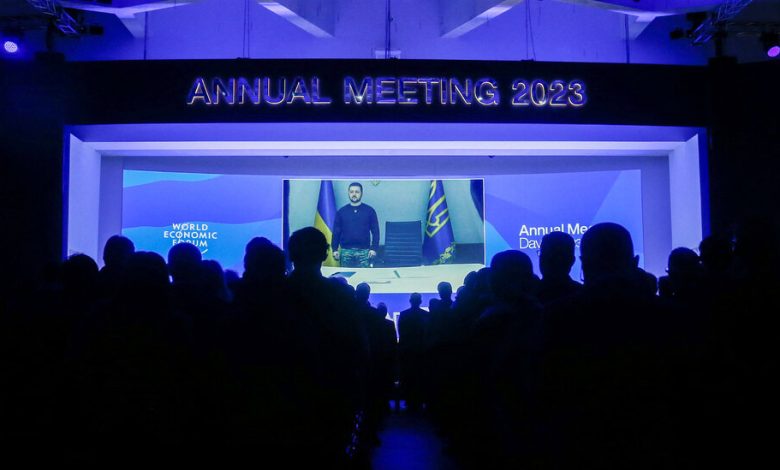‘Tragedies are outpacing life’: In a video address at Davos, Zelensky mourns the dead and pleads for help.

President Volodymyr Zelensky of Ukraine made a passionate appeal by video on Wednesday to heads of state and other decision makers gathered at the World Economic Forum in Davos, Switzerland, urging a faster pace of support for his country in the face of Russia’s invasion.
At the start of Mr. Zelensky’s address, which he delivered in English, he called for a minute of silence to honor Ukraine’s minister of internal affairs, Denys Monastyrsky, and more than a dozen others who were killed in a helicopter crash near Kyiv, Ukraine’s capital, earlier on Wednesday. He called the crash, whose cause is being investigated, a tragedy and said it was one more example of the unnecessary loss of life that had marked the conflict.
Too often, he said, Ukraine found itself in a race against time. “Tragedies are outpacing life. The tyranny is outpacing democracy,” he said. “The time the free world uses to think is used by the terrorist state to kill.”
It had taken only seconds for Russian tanks to roll across the border last February, he said, but days before sanctions were imposed. A Russian missile, he said, took only minutes to travel across the country and hit a building in the city of Dnipro, central Ukraine, on Saturday, killing 45 people.
“The supplying of Ukraine with air defense systems must outpace Russia’s next missile attacks,” he said. “The supplies of Western tanks must outpace the next invasion of Russian tanks.”
Onstage at the World Economic Forum
The annual gathering of world leaders takes place in Davos, Switzerland, from Jan. 16 to 20.
- China’s Message: China ventured back on to the global stage at the World Economic Forum, sending a delegation to assure foreign investors about its economic health after three years of pandemic isolation.
- A New Buzzword: So many global troubles have arisen in recent months that the word “polycrisis” is everywhere in Davos — even in the organization’s annual report.
- Going Nuclear: The filmmaker Oliver Stone, who has a history of jabbing the political, business and social elite with controversial projects, received a warm reception in Switzerland for a film promoting nuclear power.
Mr. Zelensky spoke during a critical week of diplomacy, as Ukraine pushes for more advanced arms including tanks and air defense missiles. On Tuesday, the Netherlands said that it intended to follow the lead of the United States and Germany and send a Patriot missile system to Ukraine. The same day, General Mark A. Milley, the chairman of the U.S. Joint Chiefs of Staff, held talks in Poland with his Ukrainian counterpart, their first face-to-face meeting since Russia’s invasion last February.
On Wednesday, NATO defense ministers began a two-day meeting in Brussels to take stock of assistance for Ukraine. On Friday, they will be at Ramstein Air Base in Germany, joined by officials from a broader group of nations coordinating the aid. The U.S. defense secretary, Lloyd J. Austin III, will lead those discussions, which will include the crucial issue of sending Western tanks.
Kyiv’s leading allies agree that time is running short to enable the Ukrainian military to break a stalemate with Russian forces along the front lines in Ukraine’s east and south. At the same time, missile attacks have devastated much of the country’s infrastructure and killed many civilians.
Since Russia invaded nearly a year ago, Mr. Zelensky has pressed his country’s case before many international groups, including the United Nations General Assembly, Congress, the European Parliament and the Group of 20 nations. Only the address to Congress was made in person.
Others are also making appeals for Ukraine at Davos. The country’s first lady, Olena Zelenska, addressed the summit on Monday, and Vitali Klitschko, the mayor of Kyiv, is there with his brother, Wladimir Klitschko, a fellow former heavyweight boxing champion.
Mr. Zelensky has repeatedly argued that Moscow felt empowered to invade Ukraine in part because of the limited international response to Russia’s invasion in 2014, during which it annexed the Crimean Peninsula and set up two breakaway republics in the eastern region of Donbas. On Wednesday, he sought to set the war in the context of a struggle for democratic values.
“We routinely defend values that some of our allies take for granted as a fact of life,” he said. “At first the world underestimates a threat, then it unites to resist it, and then the world wins.”




